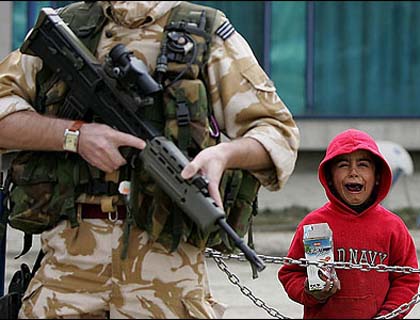Unlike many, I was not much mindful of Osama bin Laden as I am of the, so-called, radicalism (bin Ladenism). However, he was recognized as the mastermind behind terror activities, but I assume him mostly a person, who like an injured jackal timorously concealed himself and hardly could organize and lead another 9/11 attacks, due to instant fear of murder and assassination. But what I fear the most is extremism and radicalism, which includes bin Ladenism as socio-political, religious-oriented movement that has been growing since long time in Middle East and, subsequently, in AfPak. What Osama bin Laden did was the empowerment and acceleration of the process, but he definitely was not the founder of it.
Here I do not want to explain why such movement was created and developed in most of Islamic countries, what I am trying to tell here is how it is dangerous for Afghanistan as far as it concerns to current US and NATO military policies.
Eighteen months ago, when president Obama decided to surge US troops in Afghanistan, many of his military advisors and administration officials opposed him. And also, those days, many involved countries were struggling with mounting domestic pressures to withdraw their militaries completely from Afghanistan—famous as a grave of empires. The prevailing situation as well as its prospective looked grim and many used to talk about international community's military failure. President Obama was also under huge pressure as the provision of US military costs became difficult after global economic recession in 2008. Anyhow, Mr. President resisted, but in order to weaken his opposition, he redefined one of his military strategies in Afghanistan in a manner that did not make sense for me much. That was the change of "counter-insurgency struggle" into "counter-terrorism" one.
Theoretically, these two words are easily distinguishable, but are not in practice. Counter-insurgency comprises all those armed oppositions of Afghan government who might not hold Osama bin Laden's ideology. They might oppose government due to reasons other then ideology, lack welfare services, poverty and etc. While, counter-terrorism denotes a struggle against radicals and extremists who want to establish sharia-oriented government and target US and its allies' interests across the world. By definition these two words are clear, but not in countries like Afghanistan if put on practice.
It is clear that US attacked Afghanistan in 2001, to persecute Osama bin Laden and his followers. However, it is not clear whether President Bush would have done the same if Taliban militants agreed to give up all ties with Osama and deliver him to the United States. But the principle justification for international military engagement was terror-networks and their supporters. Hunting Osama and persecuting the members of al-Qaeda was not possible without dismantling and elimination of Taliban regime. Thus, counter-al-Qaeda struggle unintentionally replaced with counter-insurgency struggle. The US-led coalition decided to topple Taliban regime and dismantle its headquarters. In 2009, when president Obama surged US troops and narrowed the military targets from counter-insurgency into counter-terrorism struggle, his aim mainly was to mount pressure on al-Qaeda and eliminate threats caused by such terror networks.
But why such military strategic shift did not make sense to me? Osama bin Laden was engaged in Afghanistan since the very Soviet military invasion in 1979. He supported Afghan Jihadis with millions of dollar inherited from his father. But indubitably he did not play here a leading role, and no body in Afghanistan ever heard his name and his network's till 2001, when President Bush attacked the country to arrest him. Even Afghan Jihadis rarely heard about his presence in Afghanistan during anti-Soviet struggle or Jihad. He emerged as hero for some and a great evil for some others only after 9/11 terrorist attacks on US twin towers, however, previously he organized and operated attacks. The total members of his network do not cross hundreds and he, without support of powerful groups and organization like Taliban and ISI, could do nothing at all.
Everybody should notice that Taliban, somehow, is far bigger danger, because it has social and political base. The military tactics of Taliban is a duplicate of Al-Qaeda—taken from remote bombings to suicide attacks, to roadside bombs and etc. the ideology of Taliban is far stringent then that of al-Qaeda. Al-Qaeda is driven mostly on the basis of humiliation and feelings of avenge, which are negative, while Taliban-led militants are driven by positive objective of establishing Islamic Eimarate. To achieve the goal, al-Qaeda tactics have become the core strategy of Taliban-led militants in Afghanistan.
Now many maintain that the present world without Osama is safe and, therefore, the view to hasten military withdrawal from Afghanistan has found large supporters. The view is fuelled further due to inconvenient general economic situation and huge unemployment rate in Washington. The bipartisan confrontation has turned more severe in the United States as G.O.P. rejected the proposal to increase the level of sovereign debt which was previously set $14 trillion. Such measure entails decreasing budget deficit severely and which definitely affect military costs and expenses in Afghanistan. Therefore, now many military and administration officials are assessing steep pullout or high military drawdown this year. While, previously it was alleged that around 3000-5000 US troops may leave, but the death of Osama bin Laden and inconvenient market performances caused circles within Obama's administration to push for steeper pullout.
It should be noticed that ben Laden died but ben Ladenism didn't, and moreover, Taliban-led militants are equally dangerous to that of al-Qaeda. Hasty measure may threaten the US-led coalition achievements made after US military surge 18 months ago. Afghanistan needs foreign military assistance, because still in areas, where Taliban kept dominance, there are not signs of civilians' awakening. The military withdrawal should be gradual along with accurate assessment of ground realities; otherwise it will bring about regrettable consequences. And it also should be noticed that no country would be safe if Taliban militants do not give up their ideology and join Afghan government.

